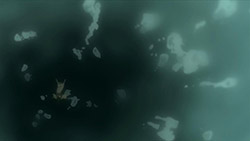 |
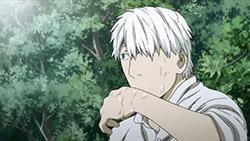 |
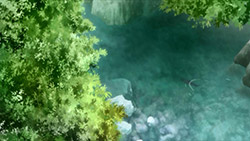 |
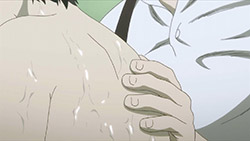 |
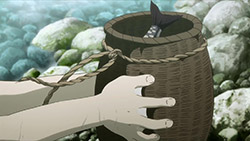 |
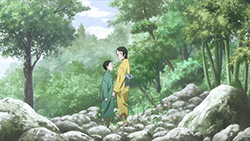 |
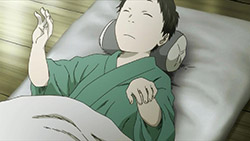 |
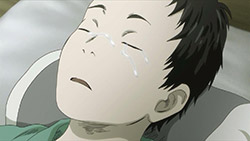 |
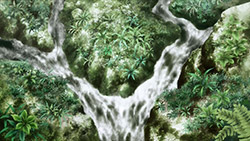 |
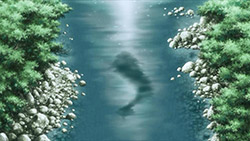 |
 |
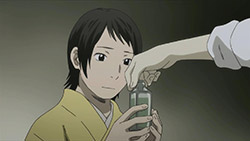 |
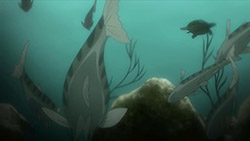 |
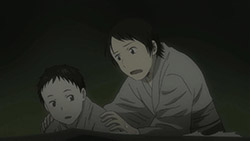 |
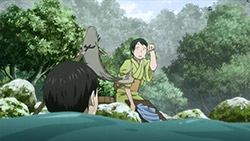 |
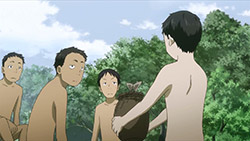 |
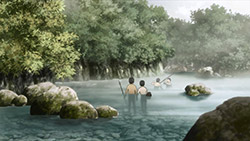 |
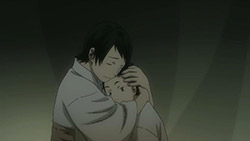 |
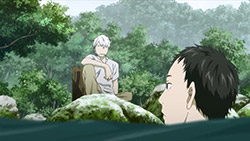 |
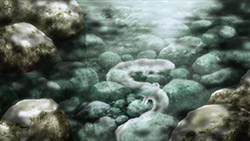 |
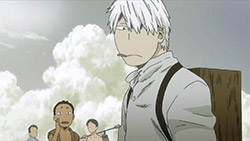 |
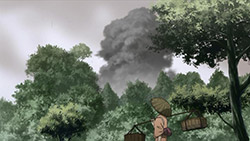 |
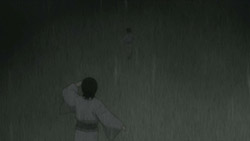 |
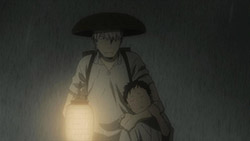 |
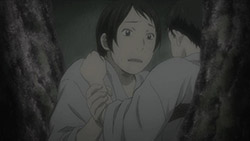 |
 |
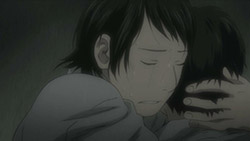 |
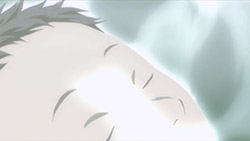 |
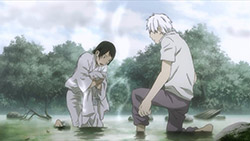 |
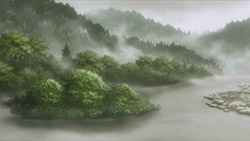 |
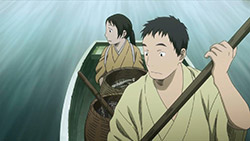 |
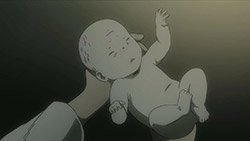 |
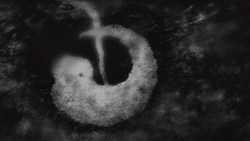 |
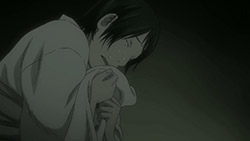 |
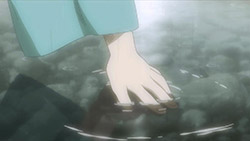 |
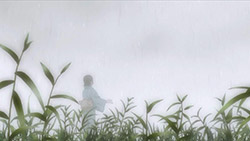 |
「水碧む」 (Mizu Aomu)
“Azure Waters”
I had the great fortune of being able to watch this episode of Mushishi with the weather outside my window being in sync with the weather on my screen. The rain motif was also quite fitting for marking Mushishi‘s return to tragedy after having indulged in the happy ending for some time. Since it has discussed mothers protecting their children for so many episodes, it’s only fair that at some point Mushishi shows them fail. It hurts as much as one might expect.
As last week, on watching this episode I can’t really blame people for being wary of the mushi-shi. They are so often bringers of bad news that nobody really wants to hear. They are storm crows, heralds of ill omen, even if most, like Ginko, are only trying to help (and one must admire Ginko’s stalwart dedication to his patients). I’m sure many would prefer to be left alone to feel good about their swimming ability or their superhuman endurance or their hunting skills, but the mushi-shi just have to come and pop their bubble. Yet it was not just Ginko butting his nose into other people’s business; Yuuta’s mother (Orikasa Fumiko) also knew, deep down, that something was wrong with her son. It was interesting, though, how the focus was less on any specific personal harm to Yuuta and more on ‘fixing’ his problems so he could be accepted with his peers. It’s telling of the communal nature of society that the greatest fear is ostracism. Yet Mushishi reminds us that the most important part to making friends is still that most difficult first step: reaching out with goodwill. Incidentally, Yuuta’s bonding moment also made me feel happy for him, which just made his end hurt just that much more.
Yuuta’s fate was not necessarily surprising, and I don’t think the intent was ever to shock the audience. Azure Waters is reminiscent of stories of selkie and similar mythologies, and those almost always, as a rule, end in tragedy. I suspected what was coming, but I still felt those pangs in my chest. The sight of a mother grieving over their child must be universally heartbreaking, especially after watching her try so hard for him as a widow. Mushishi mixes two of its big themes—motherhood and loss—painfully effectively. Yes, Mushishi has dealt with mushi giving humans fleeting second chances before, and the lesson is always to be glad of opportunities rather than regret them, but on some level one still feels the urge to curse the mushi for their fickleness. What the mushi giveth, the mushi taketh away.
One must keep in mind, though, that both Yuuta’s and his mother’s wish was for Yuuta to fit in, and that was what he did, even in the end. Azure Waters stresses all individuals being part of a greater, unseen system. All water may seem different, but all water is the same. Life, like water, runs in cycles. One may be reminded, especially, of The Travelling Swamp from season one. The Travelling Swamp was about the end of a cycle, and the mushi leaves the human behind. Azure Waters is about the renew of a cycle, and the human host is taken with the mushi. In both cases, though, we should look at the greater whole, and that is undying. Water, as river, as clouds, or as ocean, is not destroyed; it is transformed. In the rain, or in our hearts, Yuuta lives.
Preview
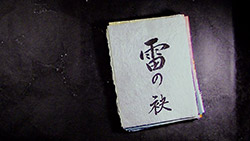 |

Wow. This episode was the most tragic Mushishi episode in recent memory, arguably the most. I honestly expected another ambiguous or bittersweet ending but it’s painful to see that even Ginko’s therapy can fail. I’m not well versed in mythology so I didn’t see this coming.
I had a mixed feeling about Yuuta’s fate. Should his mother rejoice that she got to see her son grow up, make friends, and know a mother’s love? Or does that make the pain so much worse that it would’ve been better for him not to be born? Rainfall could signify that he was never gone when one looks at the grand scheme of things but it could also be a constant reminder of her loss.
I love the concept of the Mushi, their ‘fickleness’ as you said and ambiguity leaves for a lot of flexible storytelling and this one in particular stuck with me until the morning I woke up today.
On a lighter note, if your weather sync’d perfectly with the episode…I do hope you made it through the floods okay :P.
It’s a choice between life or death.
If she wants to continue to live, she just have to rejoice about the live he had, and the facts is presence is now everywhere.
I guessed the mother was the one who drowned, and kinda guessed his identity, but it was still devastating.
Once again I’m impressed by Mushishi’s amazing and confident storytelling.
What makes it truly tragic is that no one is to blame (That’s nearly always the case in this serie). Actually, Yuta’s fate was unavoidable. At least, he left this world happy.
My initial reaction is that it started when the others end (the mid point clearly mirrored the ending of last week’s episode.)
I felt a little empty after this episode, but not for the expected reasons. I kept seeing people praise how good this episode would be–and after it aired how heartbreaking it was–but I just didn’t feel any emotional pull for it, which is already unusual for me who tends to get overly attached in most cases. Something just didn’t click with me this time, I guess.
This episode had gorgeous animation though, wow. A lot of movements (Ginko’s especially) were incredibly fluid this time around, even though the motions were small.
Them feels… I was prepared for this one but I still cried like a baby T^T
Me too. I had the feeling this one wouldn’t end “well”, but still cried like it was the ending of “Honey & Clover”. I admired the resilience of that mother and her purpose to see a world that now, to her, looks completely different after having had and lost a child.